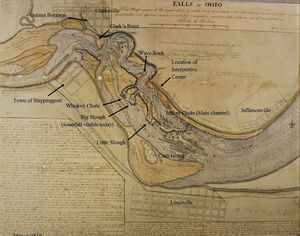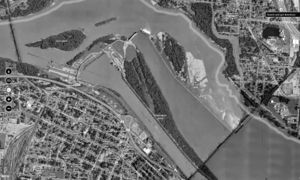Falls of the Ohio: Difference between revisions
Jump to navigation
Jump to search

imported>George Swan (first draft) |
mNo edit summary |
||
| (One intermediate revision by one other user not shown) | |||
| Line 2: | Line 2: | ||
[[File:1810-falls-area-low-water-state-with-current-identities orig.jpg | thumb | left | 1810 map of the Falls of the Ohio]] | [[File:1810-falls-area-low-water-state-with-current-identities orig.jpg | thumb | left | 1810 map of the Falls of the Ohio]] | ||
[[File:Aerial photograph of the Ohio River, at Louisville, showing the artificial canal to the south, and the (submerge) location of the Falls of the Ohio.jpg | thumb | modern aerial photo of the area of the Falls. Note the southernmost channel is a modern canal.]] | [[File:Aerial photograph of the Ohio River, at Louisville, showing the artificial canal to the south, and the (submerge) location of the Falls of the Ohio.jpg | thumb | modern aerial photo of the area of the Falls. Note the southernmost channel is a modern canal.]] | ||
A ridge of rock crosses the [[Ohio River]], at [[Louisville, Kentucky]], known as the '''Falls of the Ohio'''. It was the only navigational obstacle on the river. Passengers and cargo had to be [[portage]]d, until a canal was constructed. | A ridge of rock crosses the [[Ohio River]], at [[Louisville, Kentucky]], known as the '''Falls of the Ohio'''. It was the only navigational obstacle on the river. Passengers and cargo had to be [[portage]]d, until a canal was constructed.[[Category:Suggestion Bot Tag]] | ||
Latest revision as of 11:00, 15 August 2024
A ridge of rock crosses the Ohio River, at Louisville, Kentucky, known as the Falls of the Ohio. It was the only navigational obstacle on the river. Passengers and cargo had to be portaged, until a canal was constructed.

